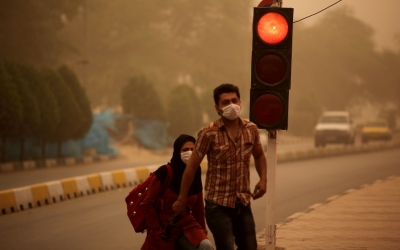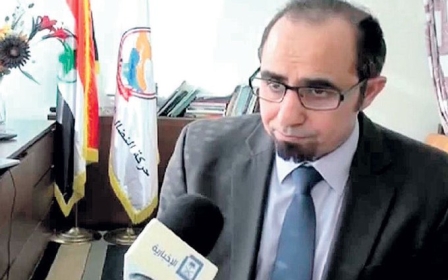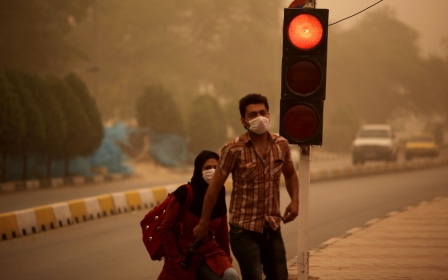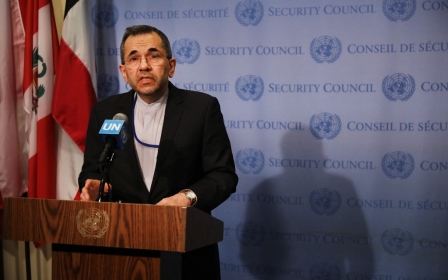Iran: Trial begins of Arab separatist leader accused of 2018 military parade attack
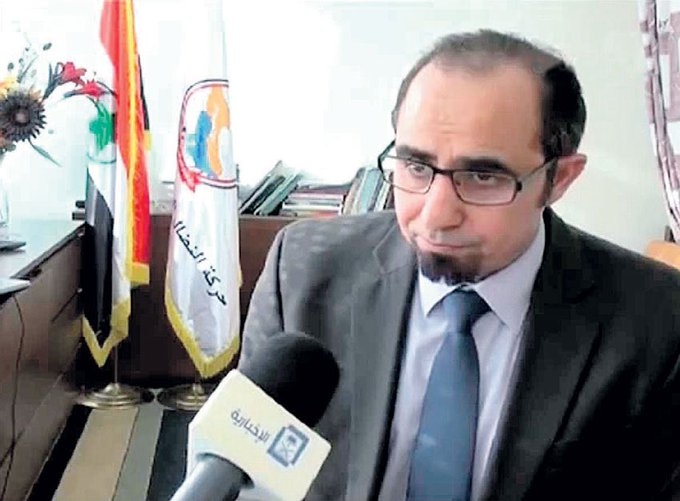
An Iranian ethnic Arab separatist leader went on trial in Iran on Tuesday, charged with involvement in an attack on a 2018 military parade that killed 25 people in the city of Ahwaz, and several bombings, state media reported.
Habib Chaab, who is in his late 40s and is an Iranian-Swedish dissident, has been held in Iran since late 2020, after he disappeared during a visit to Turkey. Iran said in 2020 that its security forces had arrested Chaab, also known as Habib Asyud, without saying where or how he was captured.
New MEE newsletter: Jerusalem Dispatch
Sign up to get the latest insights and analysis on Israel-Palestine, alongside Turkey Unpacked and other MEE newsletters
Turkey later detained 11 people, accusing them of involvement in Chaab's abduction and of smuggling him to Iran.
At Tuesday's trial, Chaab was charged with leading the separatist Arab Struggle Movement for the Liberation of Ahwaz (ASMLA), which seeks a separate state in the oil-rich Khuzestan province in southwestern Iran. He was also accused of plotting and carrying out "numerous bombings and terrorist operations" including the attack on the military parade in Ahwaz, the state news agency IRNA reported.
The prosecutor charged Chaab with being "corrupt on Earth", a capital offence under Iran’s strict form of Islamic law, IRNA said.
Video confession
Iran's Supreme Leader, Ayatollah Ali Khamenei, said at the time that the suspects behind the parade attack in September 2018 were financed by Iran's main regional rival Saudi Arabia, and the United Arab Emirates.
Chaab has previously appeared in a video, broadcast by Iranian state television, in which he claimed responsibility for launching the attack and working with Saudi intelligence services. Such videos are common in Iran, and are frequently condemned by rights groups, who argue that they are often obtained under duress.
"He is accused of spreading corruption on Earth through the formation, management and leadership of a group called the Arab Struggle Movement for the Liberation of Ahwaz, and planning and carrying out terrorist operations and destroying public property," the prosecutor's representative said.
State television showed recorded footage of the session that ran for almost an hour, a rare occurrence in Iranian courts.
Discrimination against minorities
Iran has had tense relations with its ethnic minorities, including Arabs, Kurds, Azeris and Baluch, and has accused them of aligning with neighbouring countries rather than Tehran. Arabs and other minorities have long said they face discrimination in Iran, a charge the state rejects.
Tehran designates ASMLA as a terrorist group, and blames it for a string of attacks in Khuzestan. The group carried out "bombings at government and public centres, espionage, armed attacks and acts against national security", leading to the death and injury of 74 Iranians, the prosecutor's representative added.
Dressed in blue striped prisoner's pyjamas, the bearded Chaab wore a mask as a coronavirus precaution. He listened for almost an hour to the accusations made by the prosecution, AFP reported.
Behind him sat men and women carrying pictures of relatives who lost their lives in attacks he is accused of organising, the presiding judge said.
The accusations against Chaab are based on "the Ministry of Intelligence investigation, the accused's confessions, and the available evidence," the prosecutor's representative said. Chaab has a lawyer and is physically and mentally healthy, he added.
Chaab was a dissident living in exile in Sweden and was granted Swedish nationality, but Iran does not recognise dual nationality for its nationals.
"We are in contact with representatives of Iran. We have requested, but have not been granted by Iran, consular access," Sweden's foreign ministry said in a statement on Tuesday. "Iran's stated position is that they view Habib Chaab as only an Iranian citizen and therefore view the case as an Iranian internal matter. We do not share the view stated by Iran," the statement added.
Iran-Sweden tensions
The prosecution charged that, in addition to the accused, other leaders of the group are based in Europe, including in Denmark, the Netherlands and Sweden, with the financial and logistical support of Saudi Arabia. The group's main objective was "the disintegration of the Iranian province of Khuzestan", the prosecution said.
Videos aired in court purportedly show some of the separatist movement's activities, including masked, armed men training, and an alleged member setting fire to a bank.
The trial continues, with the date of the next hearing yet to be set, the judge said.
The trial comes amid tensions between Iran and Sweden, which is prosecuting a former Iranian official arrested in Stockholm in late 2019 for having allegedly played a leading role in mass executions of political prisoners in Iran in 1988, Reuters reported.
The official, Hamid Noury, has denied the charges and Iran's judiciary on Monday denounced the hearing as a "show trial", the semi-official news agency Fars reported.
Middle East Eye delivers independent and unrivalled coverage and analysis of the Middle East, North Africa and beyond. To learn more about republishing this content and the associated fees, please fill out this form. More about MEE can be found here.


